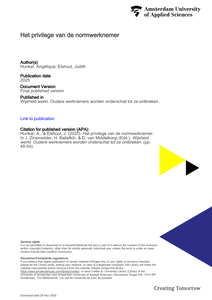Hoe verder een werknemer van het beeld van de normwerknemer verwijderd is, hoe minder vanzelfsprekend van onder andere hun kwaliteiten, ambitie en toegevoegde waarde wordt uitgegaan. In dit hoofdstuk illustren wij hoe ChatGPT en de methode van de omdraaiing kunnen helpen om deze verschillen in hoe werknemers op waarde worden geschat zichtbaar en bespreekbaar te maken.
MULTIFILE

Ervaringen met racisme kunnen subtiel doorwerken in de leerstrategieën, motivaties en werkervaringen van zowel studenten als medewerkers, wat hun kansen op succes in het hoger onderwijs kan beïnvloeden (Nieto, 2004). Bewustzijn hierover is cruciaal om een inclusieve, gelijkwaardige en effectieve onderwijsomgeving te creëren. Een open gesprek kan bijdragen aan het vergroten van dit bewustzijn. Ons uitgangspunt is dat onderwijsprofessionals middels een groepsgesprek kunnen deelnemen aan een betekenisvolle uitwisseling waarin zij de aanpak van uitsluiting en ongelijkheid in verband leren brengen met hun pedagogische verantwoordelijkheid. Maar er is weinig bekend over de randvoorwaarden voor dergelijke gespreksvoering. In dit actieonderzoek staat daarom de volgende vraag centraal: Hoe voer je een eerste, gezamenlijk groepsgesprek over racisme, macht en privilege met professionals?
MULTIFILE

The municipality of Amsterdam wants to have an emission free taxi sector by 2025. In order to reach that goal, the city has taken a number of measures which favour clean taxis above conventional taxis. One of these measures is an innovative priority privilege scheme at the Amsterdam Central Station taxi stand, which should lead to shorter waiting times and more trips for clean taxis. The municipality wants to know if the measure is effective. In this study, we present an analysis of visiting behaviour of clean and regular (diesel) taxis in order to assess the effectiveness of the privilege scheme to attract more clean taxis. As such it aims to contribute to a better understanding of the effect of the priority measure at the Amsterdam Central Station and to provide input for policy makers to introduce incentive schemes to stimulate clean taxis in cities. Analysed data covers a timespan from one year, starting October 2015 when the privilege scheme started with a call rate of 1 clean taxi to each 4 taxis called for a ride. The analysis shows the number of arriving clean taxis to shift from 1:6 to 1:4 during the observation period. Based on this analysis the municipality decided to modify the preference ratio beginning 2017. This study contributes to a better understanding of the effect of the privilege measures and provides input for policy makers introducing incentives to stimulate clean taxis in cities.
DOCUMENT

The city of Amsterdam wants to have an emission free taxi sector by 2025. In order to reach that goal, the city has taken a number of measures which favour clean taxis above conventional taxis. In 2017, as part of this policy, the city of Amsterdam decided to allow only clean taxis at the Leidseplein taxi stand, one of the busiest taxi stands in the city. This taxi stand is characterized by large numbers of passengers within very short periods at social evenings and nights on Thursdays, Fridays and Saturdays. The municipality wanted to know if the number of clean taxis in Amsterdam would be sufficient to handle these high peaks of passengers.In this study, Amsterdam University of Applied Sciences (AUAS) presents a monitoring tool that was developed to follow the visiting behaviour of clean (electric and green gas vehicles) and regular (diesel) taxis at the Leidseplein taxi stand. The tool served as a basis for the municipality to evaluate the feasibility of making this taxi stand completely clean. As such this tool aims to contribute to a better understanding of the effect of this privilege measure and to provide input for policy makers to introduce privilege schemes to stimulate clean taxis in cities.
DOCUMENT

Fluidity models in the supply chain privilege the sustainable integration of capabilities and collaboration among its members in order to guarantee an efficient and safe flow of resources throughout all its processes. This research proposes a fluidity model for the agroindustry supply chain as a solution with regard to the sector’s needs of supply chain processes, and opportunities to collaborate within the field of innovation and sustainability through of traceability and proactive risk management as a tool for creating resilient systems. The model is based on a holistic vision that will allow it to adapt to an ever more complex and continuously transformed global environment that demands solutions to assess the global impact of local decision-making in the supply chain over a period of time, considering its implications and contributions to the agroindustry and agro-logistics sector. Finally, pertinent research areas are identified in the integration of agroindustry supply chain echelons.
DOCUMENT
Uitspraak van het Europees Hof voor de Rechten van de Mens, met noot.
DOCUMENT

In het klimaatakkoord zult u tevergeefs zoeken naar een plan de luchtvaart klimaatvriendelijker te maken. Voor Martien Visser alle reden om de luchtvaartsector in het Klimaatakkoord 2.0 op te nemen en als Nederland bij te dragen aan de ontwikkeling van schone vliegtuigen.
LINK
Vergeet de ruzies die volwassenen erover maken en kijk door de ogen van een kind. Een kind kan vele pieten aan, als de mythe maar intact blijft. In dit artikel in Trouw 11-11-2015 komen twee pedagogen aan het woord over de zwartepietendiscussie, onder wie lector Christa Nieuwboer van Fontys Hogeschool Pedagogiek.
DOCUMENT

Poster. We studied Karen meme as a crowdsourced phenomenon, presenting a missed-behaved consumer, involved in multiple sociopolitical concerns over time. Through these memes, the crowd expresses different emotions, visual expressions, and use intertextual references for presenting Karen and the episode of Karen.
DOCUMENT
